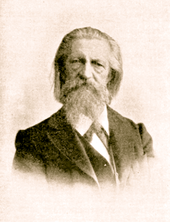Julius Grosse
Julius Waldemar Grosse (born April 25, 1828 in Erfurt ; † May 9, 1902 in Torbole , Italy ) was a German writer ( pseudonym : Otfried von der Ilm ) and theater critic .
Life
Julius Grosse, the son of a military chaplains , studied from 1849 in Halle (Saale) jurisprudence . During his studies he became a member of the Fürstenthal fraternity in 1849 . Early dramas emerged in the next few years. In 1851 his first works, the tragedy Cola di Rienzi and the comical night role Shakespeare were performed with such success that Grosse decided to drop out of his studies.
In 1852 he moved to Munich , which at that time attracted artists from all over the German-speaking area. Grosse temporarily tried his hand at canvas and studied painting at the academy until 1855 . Together with his friend, great poet and later Nobel laureate in literature, Paul Heyse , he founded the literary group " Die Krokodile " in 1854 , an association of mostly north German writers in Munich. From 1855 to 1861 Grosse was employed as a theater critic for the features section of the Neue Münchner Zeitung . After an interlude as an editor at the Leipziger Illustrirten Zeitung , he returned to the Bavarian capital in 1862 and worked for the Bayrische Zeitung until it ceased publication five years later. Grosse, however, as Goethe's successor in the role of editor of the magazine Propylaen and advisory board of the court theater, had enough other occupations.
From 1869, Grosse lived alternately in Dresden and Weimar , where he had to stay because of his new job as General Secretary of the Schiller Foundation. As early as 1870 and 1871-73, editions of the writer's works appeared with the collected dramatic works and the narrative poems . In 1885, Grosse moved back to Munich. Honored as a Grand Ducal Councilor and Professor, he died in 1902 on Lake Garda at the age of 74.
Literary work
Grosse was one of the most productive writers of his time. His stage plays hardly ever achieved great public success, the more so did his poems and prose texts. Meyer's Konversationslexikon wrote about the author at the end of the 19th century:
- Great talent as a poet is clearly characterized by the side of lively imagination, colorful description and linguistic dexterity, but suffers from the excessive agility with which the poet absorbs matters to which he lacks a closer relationship and which he therefore only treats externally able. He does his best in poetry and narrative poems; he lacks the energy of characteristic and immediate passion for drama.
Works (selection)
- Romance , ballad
- Poems (1857), collection of poems
- The Ynglinger (1858), tragedy
- The Girl from Capri (1860), poem
- Novellas (1862–63)
- Gundel from Königssee. Idyll in verse (1864)
- Vox populi (1867), short stories
- Unfaithful out of pity (1868), novella
- From eventful days (1869), collection of poems
- An old love (1869), novella
- A Revolutionary (1869), novella
- Pesach Pardel (1869 or 70), comical poem
- Against France (1870), poems
- Maria Mancini (1871), novella
- Hilpah and Shalum, an Antediluvian Tale (1871)
- Der Wasunger Not, a tragic-comic hero song (1873)
- Open Wounds (1873), short stories
- Daponte and Mozart (1874)
- The adventures of the Kalevids. Estonian folk tale (1875)
- New Stories (1875)
- Sophie Monnier (1876), novella
- Tiberius (1876), drama
- Sophie Monnier (1876), novella
- Double measure (1878)
- Poems. New selection. (1882)
- A Bourgeois Demetrius (1884)
- Faithful Eckart (1885)
- Ein Frauenlos (1888), novella
- Cousin Isidore . In: German Novellenschatz . Edited by Paul Heyse and Hermann Kurz. Vol. 20. 2nd ed. Berlin, [1910], pp. 103-236. In: Weitin, Thomas (Ed.): Fully digitized corpus. The German Novellenschatz . Darmstadt / Konstanz, 2016 ( digitized and full text in the German text archive )
literature
- Adolf Bartels : Julius Grosse , in: Mitteldeutsche Lebensbilder, Volume 1, Lebensbilder des 19. Jahrhundert, Magdeburg 1926, pp. 282–293
- Roland Berbig: Julius Grosse . In: Walther Killy (Ed.): Literature Lexicon. Authors and works in German . Bertelsmann Lexikon Verlag, Munich 1988 ff., Vol. 2
- Fritz Martini: Grosse, Julius Waldemar. In: New German Biography (NDB). Volume 7, Duncker & Humblot, Berlin 1966, ISBN 3-428-00188-5 , p. 149 f. ( Digitized version ).
- Steffen Raßloff : Forgotten poet . A plaque honors Julius Grosse at the house where he was born in Erfurt. In: Thüringer Allgemeine from August 3, 2013.
- Helge Dvorak: Biographical Lexicon of the German Burschenschaft. Volume II: Artists. Winter, Heidelberg 2018, ISBN 978-3-8253-6813-5 , pp. 264-266.
Web links
- Literature by and about Julius Grosse in the catalog of the German National Library
- Works by and about Julius Grosse in the German Digital Library
- The estate in the Bavarian State Library
- Works by Julius Grosse in the Gutenberg-DE project
| personal data | |
|---|---|
| SURNAME | Big one, Julius |
| ALTERNATIVE NAMES | Otfried von der Ilm, Ichnoymon |
| BRIEF DESCRIPTION | German writer and theater critic |
| DATE OF BIRTH | April 25, 1828 |
| PLACE OF BIRTH | Erfurt |
| DATE OF DEATH | May 9, 1902 |
| Place of death | Torbole |
